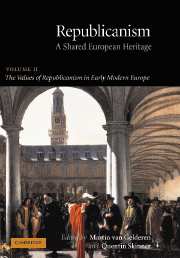Book contents
- Frontmatter
- Contents
- Contents of Volume I
- Acknowledgments
- Introduction
- Part I Republicanism and Political Values
- Part II The Place of Women in the Republic
- Part III Republicanism and the Rise of Commerce
- 10 Republicanism and Commercial Society in the Scottish Enlightenment: The Case of Adam Ferguson
- 11 Scots, Germans, Republic and Commerce
- 12 Neo-Roman Republicanism and Commercial Society: The Example of Eighteenth-century Berne
- 13 Republicanism and Commercial Society in Eighteenth-century Italy
- 14 Republicanism, State Finances and the Emergence of Commercial Society in Eighteenth-century France – or from Royal to Ancient Republicanism and Back
- 15 Commercial Realities, Republican Principles
- Bibliography
- Contributors
- Index of Names of Persons
- Index of Subjects
11 - Scots, Germans, Republic and Commerce
Published online by Cambridge University Press: 11 January 2010
- Frontmatter
- Contents
- Contents of Volume I
- Acknowledgments
- Introduction
- Part I Republicanism and Political Values
- Part II The Place of Women in the Republic
- Part III Republicanism and the Rise of Commerce
- 10 Republicanism and Commercial Society in the Scottish Enlightenment: The Case of Adam Ferguson
- 11 Scots, Germans, Republic and Commerce
- 12 Neo-Roman Republicanism and Commercial Society: The Example of Eighteenth-century Berne
- 13 Republicanism and Commercial Society in Eighteenth-century Italy
- 14 Republicanism, State Finances and the Emergence of Commercial Society in Eighteenth-century France – or from Royal to Ancient Republicanism and Back
- 15 Commercial Realities, Republican Principles
- Bibliography
- Contributors
- Index of Names of Persons
- Index of Subjects
Summary
Introduction
During the second half of the eighteenth century, the major texts of the Scottish Enlightenment made their most significant Continental debut in the cultural and scholarly centres of the Holy Roman Empire. Scottish books met with an alert and admiring German reading public, and affected many aspects of German intellectual life. German philosophy, especially epistemology, ethics and aesthetics, and belles-lettres and literary theory were inspired by the writings of David Hume, William Robertson, Adam Ferguson and Thomas Reid. By interesting contrast, Scottish political thought was one of the fields that least affected German readers. More specifically, Scottish ideas of the modern polity, seen as a full-fledged commercial society, and the Scottish fascination with the possibility of retaining republican virtue therein, mostly remained beyond the discursive scope of German political thinkers. Consequently, as I will argue, it is possible to discern two, at the very least two, very different ‘republicanisms’ in Europe prior to the outbreak of the French Revolution.
If we focus our gaze mainly on the history of books and reading, this omission is difficult to explain. The published works of many Scottish authors arrived in Germany between 1760 and 1800, either in their original English versions, or in English-language reprints, or, most often, in rapidly produced and fairly accurate German translations. Scottish authors were avidly read. Most highly regarded, alongside the fascinating but questionable Hume, were Smith and Ferguson, less questionable and no less fascinating (Maurer 1987; Gawlick and Kreimendahl 1987; Waszek 1985; Oz-Salzberger 1995a).
- Type
- Chapter
- Information
- RepublicanismA Shared European Heritage, pp. 197 - 226Publisher: Cambridge University PressPrint publication year: 2002
- 5
- Cited by



